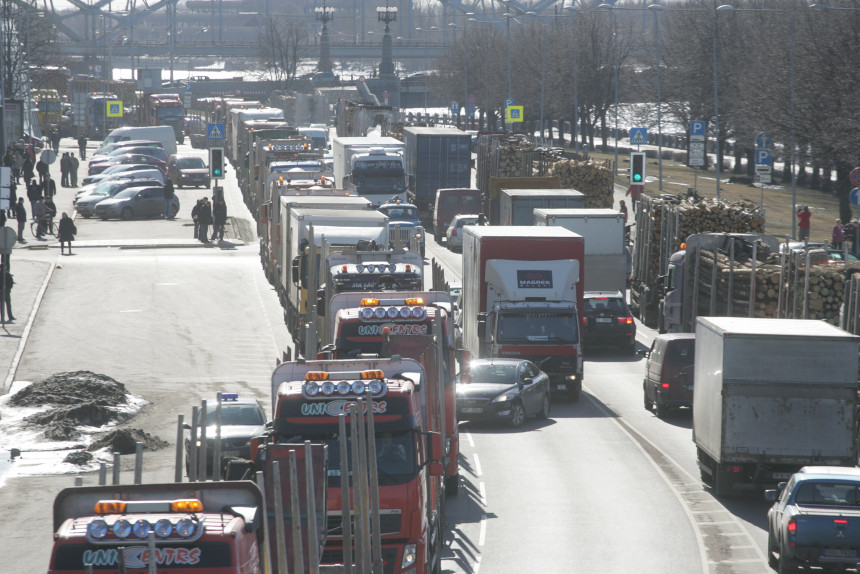The increase in car taxes is shifted to heavy transport

After the Ministry of Transport's attempt to scrape together money for the purchase of diesel trains using tax on the import of used cars was successfully thwarted, the amendments to the Law on the Vehicle Operation Tax and Company Car Tax have been revised and now the entire tax increase will be borne by heavy transport, of which the industry has not been informed at all.
At present, the Ministry of Transport and the government are no longer in the process of drafting the law, as the amendments have already been sent to the Saeima and adopted in the first reading. Prime Minister Krišjānis Kariņš's promise to remove the scandalous proposal for an additional tax on all cars imported to Latvia, except for completely new and expensive ones, has been fulfilled. It is no longer in the bill. However, the Ministry of Transport has not given up on the dream of diesel trains and has moved the planned increase in car tax on heavy transport and a few other small positions. Moreover, on the same false grounds that it is necessary to encourage the purchase of environmentally friendly transport.
The industry has been bypassed
The annotation of the draft law in the section “Results of public participation” states that “objections and proposals from the public representatives have not been received”. That also is practically a lie, because the main organization representing the interests of road hauliers in Latvia and abroad, Latvijas Auto, has not been invited to the development of the relevant amendments at all. This is confirmed to Neatkarīgā by the chairman of the board of the association Aleksandrs Pociluiko. They had learned about the upcoming tax increase only now, when the draft law is already in the Saeima before the final reading. What does this tax increase mean for the industry? The representative of road hauliers admits that the situation is already critical - the so-called European Mobility Package restricts and discriminates against Eastern European companies in Western Europe, work is also hampered by excessive suspicion from banks, but now there is another complication, a significantly higher tax.
In the international market we will become uncompetitive, but in the domestic market we will eat each other alive,
predicts Aleksandrs Pociluiko. The chance to change something is becoming less and less possible.
Again with the nonsense about the environment
The Ministry of Transport and the government have successfully avoided fair negotiations with the haulage industry. But the Saeima is approaching the final approval of the budget law package and has already announced that “It is planned to change the vehicle operation tax for trucks; increase the rate for company cars ". Here's a quote from it.
“On Wednesday, October 28, the Saeima in the first reading supported amendments to the Law on the Vehicle Operation Tax and Company Car Tax, which envisages the tax on trucks to be further determined according to the amount of carbon dioxide emissions generated by the car engine. The draft law is included in next year's state budget draft law package. Amendments are proposed in order to promote the use of cleaner and more environmentally friendly trucks in transport (...)"
This environmental "friendship" will automatically increase the cost of transporting and, consequently, of everything that is transported by trucks. The costs are ultimately always borne by the consumer. Car owners can stop rejoicing that the big tax increase ignores them. At the moment, perhaps it does, but raising taxes on internal combustion engines is already a planned policy in a number of strategic documents related to transport or climate. Most likely, the coalition will return to this issue next year. In addition, in the existing draft law, trucks are the main, but not the only ones that will carry the severity of the tax increase.
How much to take from who
The tax is also increased for buses. For pickups, that are so common in the countryside. For trailers. Although this is completely contrary to environmental considerations - also for motorcycles. An additional tax of 300 euros has been imposed on car engines over 3.5 liters. The company car tax is also being raised.
The total projected increase in vehicle operating tax revenue over the next three years is planned to amount to almost 14 million euros (EUR 13,859,724). Truck owners will gather an additional 4.2 million a year, buses - 309 thousand, motorcycles - 30 thousand.
In turn, companies will pay an additional 5.1 million for their passenger cars over a three-year period. So, in total, the medium-term budget will receive an additional almost 19 million.
But it still is not enough for the Ministry of Transport's planned purchase of environmentally harmful diesel trains, it requires about 75 million, which was previously planned to be collected with the new tax on the import of cars. So it is expected that the coalition will somehow try to squeeze another 56 million euros from car owners. We will probably know next year exactly how the Ministry of Transport will promote the purchase of “cleaner and more environmentally friendly transport” in order to buy diesel trains.